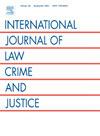Breaking barriers? A study of individual and societal influences on engagement with women's police stations in Guatemala
IF 1.4
4区 社会学
Q3 CRIMINOLOGY & PENOLOGY
International Journal of Law Crime and Justice
Pub Date : 2025-06-09
DOI:10.1016/j.ijlcj.2025.100764
引用次数: 0
Abstract
The utilization of women's police stations is increasing in practice across the Global South, and more recently, in Guatemala. While women's police stations (WPS's) provide essential services by offering resources for women experiencing violence, more research is needed to understand how these stations operate in different country contexts. This work must consider the individual and societal correlations that may impact who comes to these stations. This study examines the characteristics of individuals who have utilized these WPS's, including ethnicity, age, marital status, and educational attainment. It also considers government-mandated stay-at-home orders during the COVID-19 pandemic, as well as broader societal levels of trust in police and their correlation to why individuals may or may not utilize these stations. Results show that societal trust in police has a positive and significant impact on the rate of cases seen by WPS's in Guatemala. Mayans were not significantly more or less likely to come to the WPS's, even when considering interactive effects between trust in police and Mayan ethnicity. Areas for future research and exploration are discussed.
打破壁垒?关于个人和社会对参与危地马拉妇女警察局的影响的研究
在整个全球南方,以及最近在危地马拉,利用妇女警察局的做法正在增加。虽然妇女警察局通过向遭受暴力的妇女提供资源提供基本服务,但需要更多的研究来了解这些警察局如何在不同的国家情况下运作。这项工作必须考虑到个人和社会的相关性,这可能会影响谁来到这些电台。本研究考察了使用这些WPS的个人的特征,包括种族、年龄、婚姻状况和教育程度。它还考虑了2019冠状病毒病大流行期间政府强制的居家令,以及更广泛的社会对警察的信任程度,以及它们与个人可能会或可能不会使用这些警察局的原因之间的关系。结果表明,社会对警察的信任对危地马拉WPS看到的案件率有积极和显著的影响。即使考虑到对警察的信任和玛雅种族之间的互动影响,玛雅人来WPS的可能性也没有明显的增加或减少。讨论了今后研究和探索的领域。
本文章由计算机程序翻译,如有差异,请以英文原文为准。
求助全文
约1分钟内获得全文
求助全文
来源期刊
CiteScore
2.70
自引率
0.00%
发文量
25
审稿时长
47 days
期刊介绍:
The International Journal of Law, Crime and Justice is an international and fully peer reviewed journal which welcomes high quality, theoretically informed papers on a wide range of fields linked to criminological research and analysis. It invites submissions relating to: Studies of crime and interpretations of forms and dimensions of criminality; Analyses of criminological debates and contested theoretical frameworks of criminological analysis; Research and analysis of criminal justice and penal policy and practices; Research and analysis of policing policies and policing forms and practices. We particularly welcome submissions relating to more recent and emerging areas of criminological enquiry including cyber-enabled crime, fraud-related crime, terrorism and hate crime.

 求助内容:
求助内容: 应助结果提醒方式:
应助结果提醒方式:


